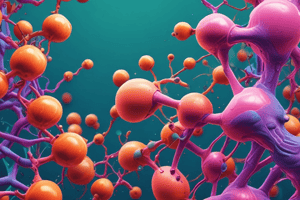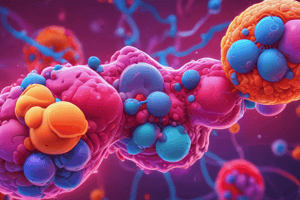Podcast
Questions and Answers
Where are receptors of protein hormones and adrenal medullary hormones situated?
Where are receptors of protein hormones and adrenal medullary hormones situated?
- Golgi apparatus
- Nucleus
- Endoplasmic reticulum
- Cell membrane (correct)
Which type of hormone has receptors located in the cytoplasm of target cells?
Which type of hormone has receptors located in the cytoplasm of target cells?
- Peptide hormones
- Protein hormones
- Amino-acid derivative hormones
- Steroid hormones (correct)
What is the effect called when two or more hormones work together to produce a particular result?
What is the effect called when two or more hormones work together to produce a particular result?
- Additive Effect
- Permissive Effect
- Antagonistic Effect
- Synergistic Effect (correct)
Which hormone type requires receptors in the nucleus of the cell for its actions?
Which hormone type requires receptors in the nucleus of the cell for its actions?
Which hormone type has receptors that are specifically for one single hormone?
Which hormone type has receptors that are specifically for one single hormone?
In hormone interactions, what does the Permissive Effect refer to?
In hormone interactions, what does the Permissive Effect refer to?
Which type of hormones do not enter the target cells but instead bind to receptors on the plasma membrane?
Which type of hormones do not enter the target cells but instead bind to receptors on the plasma membrane?
Which of the following hormones are considered lipophilic or hydrophobic?
Which of the following hormones are considered lipophilic or hydrophobic?
What is the main difference between polypeptide and protein hormones?
What is the main difference between polypeptide and protein hormones?
Where are the receptors for polypeptide hormones located?
Where are the receptors for polypeptide hormones located?
Which type of hormones bind to intracellular proteins and act directly within the target cells?
Which type of hormones bind to intracellular proteins and act directly within the target cells?
What is a common characteristic of polar (water-soluble) hormones?
What is a common characteristic of polar (water-soluble) hormones?
What is the main difference between negative feedback and positive feedback in hormone secretion?
What is the main difference between negative feedback and positive feedback in hormone secretion?
Which gland is responsible for secreting Growth Hormone (GH) and Thyroid-stimulating hormone (TSH)?
Which gland is responsible for secreting Growth Hormone (GH) and Thyroid-stimulating hormone (TSH)?
What type of hormones are Growth Hormone (GH) and Thyroid-stimulating hormone (TSH)?
What type of hormones are Growth Hormone (GH) and Thyroid-stimulating hormone (TSH)?
Which hormone prevents water loss by increasing water reabsorption in the kidneys?
Which hormone prevents water loss by increasing water reabsorption in the kidneys?
Which gland secretes Melanocyte Stimulating Hormone (MSH)?
Which gland secretes Melanocyte Stimulating Hormone (MSH)?
What hormone is responsible for uterine contractions during childbirth and milk ejection during breastfeeding?
What hormone is responsible for uterine contractions during childbirth and milk ejection during breastfeeding?
Flashcards are hidden until you start studying
Study Notes
Hormone Receptors
- Receptors of protein hormones and adrenal medullary hormones are situated on the plasma membrane of target cells.
- Steroid hormones have receptors located in the cytoplasm of target cells.
Hormone Interactions
- The effect of two or more hormones working together to produce a particular result is called synergism.
- The Permissive Effect refers to when one hormone cannot produce its effect without the presence of another hormone.
Hormone Types
- Lipophilic or hydrophobic hormones are steroid hormones, which require receptors in the nucleus of the cell for their actions.
- Polypeptide hormones have receptors located on the plasma membrane of target cells and do not enter the cell.
- A common characteristic of polar (water-soluble) hormones is that they cannot cross the plasma membrane and bind to receptors on the surface of the cell.
Hormone Regulation
- The main difference between negative feedback and positive feedback in hormone secretion is that negative feedback reduces hormone secretion, while positive feedback increases hormone secretion.
Endocrine Glands and Hormones
- The pituitary gland is responsible for secreting Growth Hormone (GH) and Thyroid-stimulating hormone (TSH).
- Growth Hormone (GH) and Thyroid-stimulating hormone (TSH) are polypeptide hormones.
- The hormone that prevents water loss by increasing water reabsorption in the kidneys is Antidiuretic Hormone (ADH).
- The pituitary gland secretes Melanocyte Stimulating Hormone (MSH).
- Oxytocin is responsible for uterine contractions during childbirth and milk ejection during breastfeeding.
Studying That Suits You
Use AI to generate personalized quizzes and flashcards to suit your learning preferences.




